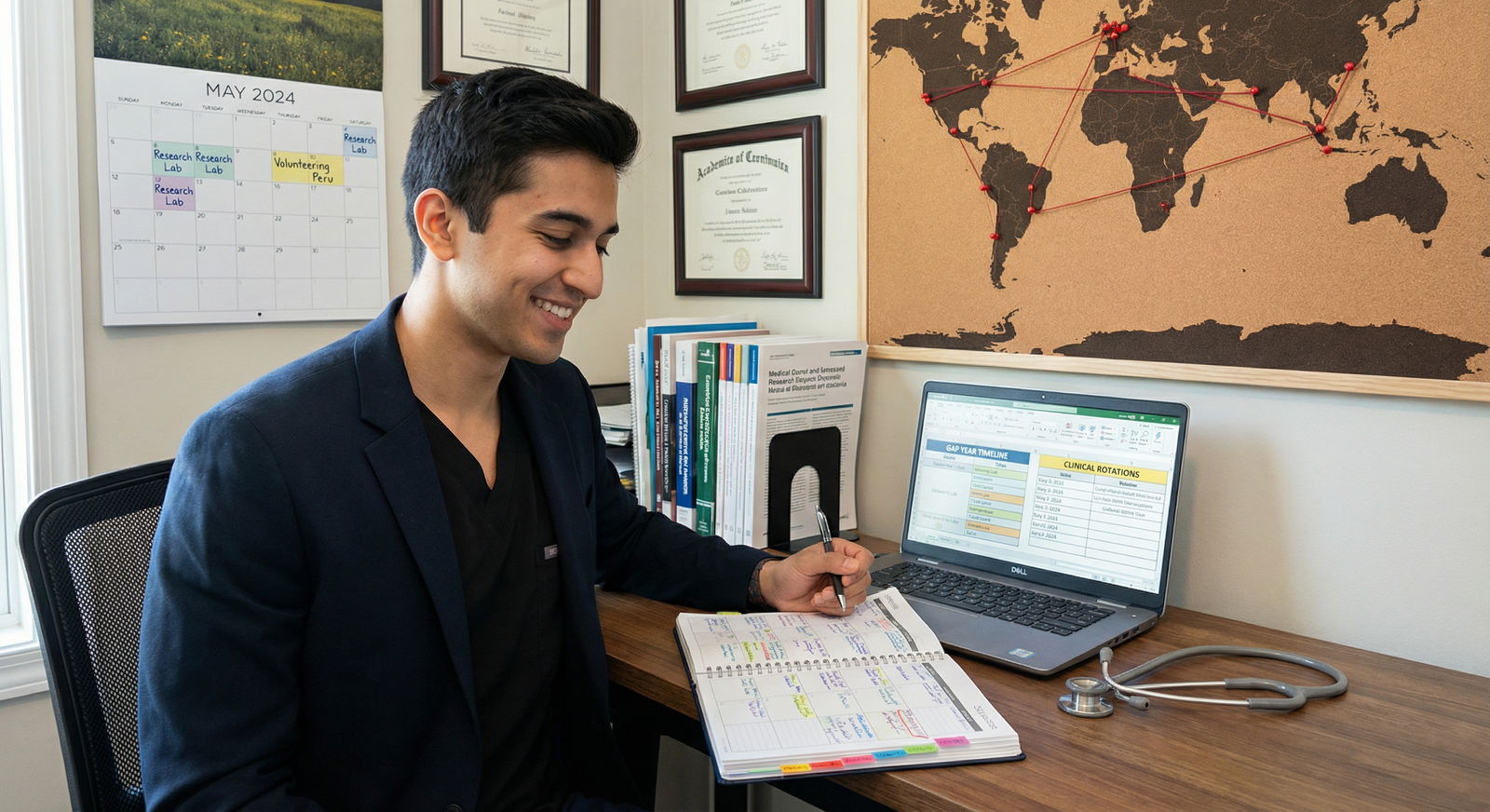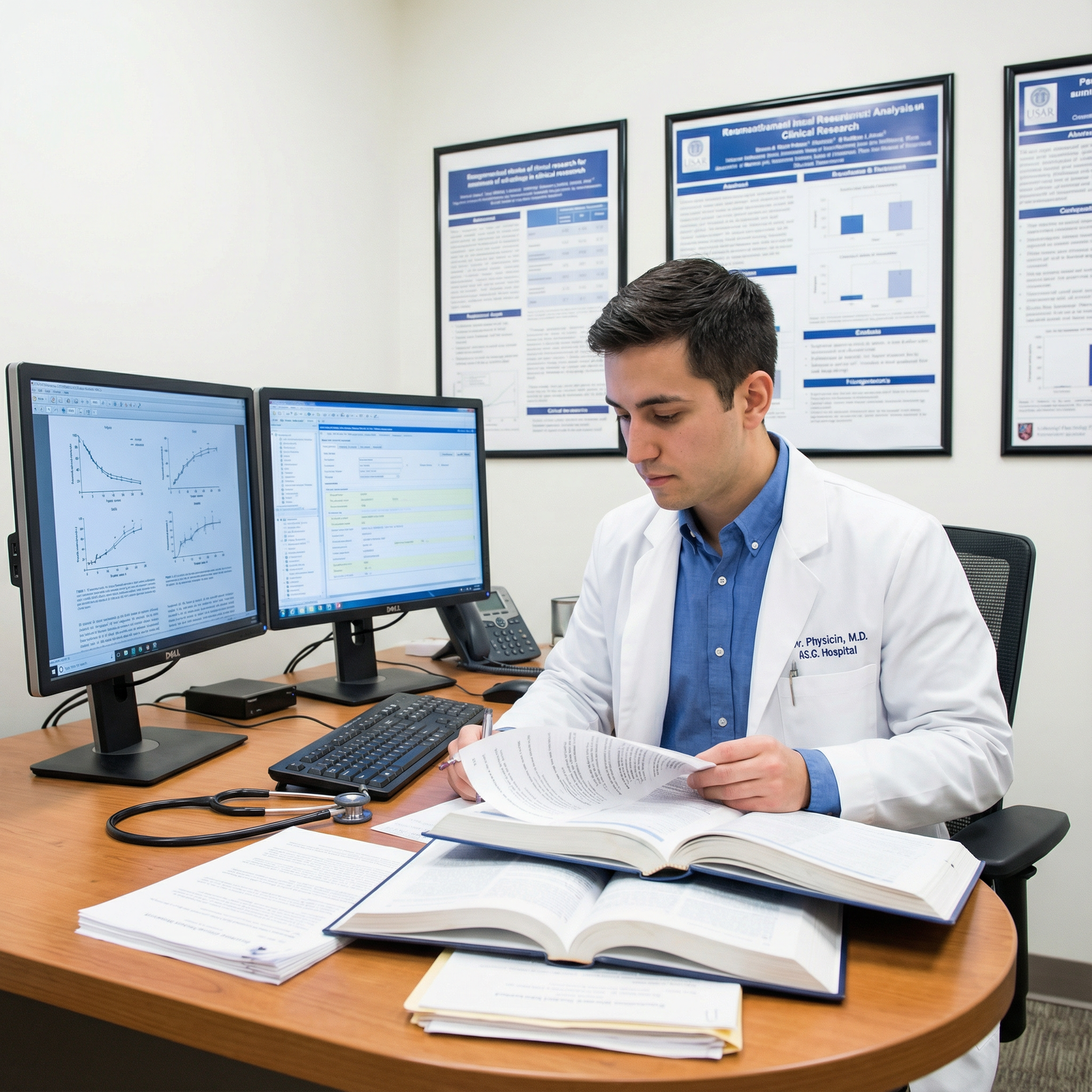
Maximize Your Gap Year: 10 Powerful Ways to Strengthen Your Residency Application
Introduction: Turning a Break into a Strategic Boost for Your Medical Career
A gap year before residency can feel like standing at a crossroads in your medical career. For some, it’s a chance to rest after the intensity of medical school. For others, it’s a necessary pause to improve a residency application, explore new interests, or address gaps in their CV.
Used intentionally, this time can become one of the most transformative phases of your professional life. A well-planned gap year can:
- Sharpen your clinical skills and confidence
- Expand your healthcare experience
- Strengthen your research and scholarly profile
- Clarify your specialty choice and long-term goals
- Demonstrate maturity, resilience, and self-directed growth to program directors
Below are 10 strategic, high-yield ways to maximize your gap year so that it not only recharges you, but also significantly enhances your residency application and sets you up for long-term success in medicine.
1. Engage in High-Impact Clinical Experience
Hands-on clinical exposure is one of the most valuable ways to use a gap year, especially if you are aiming to strengthen your residency application or clarify your specialty choice.
Why Meaningful Clinical Experience Matters
Residency programs want to see that you:
- Function comfortably in clinical environments
- Understand workflow, interprofessional collaboration, and patient communication
- Are committed to a career in medicine, not just the academic side
This is especially important for:
- International medical graduates (IMGs)
- Applicants changing specialties
- Students with limited recent clinical experience
Types of Clinical Roles to Consider
- Medical scribe (ED, clinic, hospitalist, specialty practice)
- Enhances documentation, clinical reasoning, and familiarity with EMRs
- Clinical research coordinator with patient-facing responsibilities
- Medical assistant or clinical support staff in outpatient clinics
- Postgraduate sub-internships or observerships (for IMGs or those needing US clinical experience)
- Physician shadowing with structured goals (e.g., focusing on a specific specialty)
Action Steps
- Make a list of your target specialties and settings (academic vs community, inpatient vs outpatient).
- Reach out to teaching hospitals, community clinics, or private practices and inquire about scribe, MA, or assistant roles.
- For IMGs or those with older graduation dates, prioritize formal US clinical experience with letters of recommendation potential.
- Keep a log of cases, skills, and meaningful patient encounters; these will inform your personal statement and interview answers.
2. Pursue Research and Scholarly Work That Aligns with Your Goals
Research is a powerful way to signal intellectual curiosity, discipline, and commitment to academic medicine. It can be particularly impactful if you’re pursuing a competitive specialty (e.g., dermatology, orthopedics, radiology, neurosurgery) or academic internal medicine or pediatrics.
Why Research Is Valuable for Residency Applications
- Demonstrates analytical thinking and scientific literacy
- Shows you can contribute to the academic mission of a program
- Provides concrete productivity: abstracts, posters, presentations, and publications
- Offers strong letters of recommendation from research mentors
Types of Research and Scholarly Activities
- Basic science research in a lab setting
- Clinical research in your field of interest
- Quality improvement (QI) projects within hospitals or clinics
- Systematic reviews or meta-analyses
- Educational research (curriculum development, assessment projects)
If formal bench or clinical research isn’t available, QI or educational projects can still be very impactful and are often more feasible within a one-year time frame.
Action Steps
- Email faculty, program directors, or previous mentors with a brief, professional message:
- State your background
- Express specific interests
- Ask if there are ongoing projects where you can contribute
- Be open to starting with data collection or chart review; these often evolve into abstracts or manuscripts.
- Aim to present at:
- Regional or national specialty conferences
- Institutional research days
- Keep a structured record of:
- Project titles
- Your role
- Outcomes (submitted, accepted, presented, published)
This level of detail will make completing ERAS and discussing your work during interviews much easier.

3. Volunteer in Underserved Communities and Global Health Settings
Volunteering in underserved communities adds depth and authenticity to your residency application while reinforcing why you chose medicine in the first place.
Why Service in Underserved Settings Matters
- Demonstrates a genuine commitment to equity, public health, and social responsibility
- Builds cultural humility and adaptability
- Exposes you to healthcare disparities and structural barriers to care
- Provides rich, meaningful stories for interviews and personal statements
Types of Opportunities
- Local free clinics or safety-net hospitals
- Mobile clinics for homeless, migrant, or rural populations
- Public health outreach: vaccination drives, screening events, health fairs
- Global health initiatives or medical missions (when reputable and ethically structured)
If you pursue international experiences, prioritize programs that:
- Partner with local clinicians
- Emphasize continuity, sustainability, and capacity building
- Avoid “voluntourism” and maintain ethical standards of care
Action Steps
- Explore opportunities through:
- Medical school global health offices
- National organizations (e.g., Doctors Without Borders-like NGOs, community health nonprofits)
- Clarify your role in advance: Are you observing, educating, or assisting with specific tasks?
- Journal your experiences—especially moments that changed your perspective on healthcare delivery or patient care. These reflections are invaluable for residency essays and interviews.
4. Earn Additional Certifications and Practical Skills
Your gap year is a prime opportunity to build practical competencies that directly translate to residency readiness.
Certifications That Strengthen Your CV
- ACLS (Advanced Cardiac Life Support) – nearly universal relevance
- BLS (Basic Life Support) – foundational and often required
- PALS (Pediatric Advanced Life Support) – highly useful for pediatrics, EM, anesthesia, family medicine
- NRP (Neonatal Resuscitation Program) – helpful for pediatrics, OB/GYN, family medicine
- ATLS (Advanced Trauma Life Support) – valuable for surgery, EM, trauma-related fields
Skill-Based Courses and Workshops
- Point-of-care ultrasound (POCUS) workshops
- Suturing and minor procedures courses
- EKG interpretation and radiology basics
- Simulation-based training in emergencies or code leadership
Action Steps
- Review residency program websites or talk with residents in your target specialties to identify valued certifications.
- Schedule courses early—popular ACLS/PALS/ATLS sessions fill quickly.
- Add completed certifications prominently to your CV and ERAS under Education and Additional Training sections.
5. Build a Strategic Professional Network in Medicine
Networking during your gap year is about more than “who you know”; it’s about building authentic professional relationships that support your growth and open doors.
Why Networking Is Critical to Your Residency Application
- Can lead to strong letters of recommendation
- Increases your visibility to programs and faculty
- Provides insider insight into different residency cultures and expectations
- Helps you find shadowing, research, and teaching roles
Where and How to Network
- Conferences and specialty society meetings
- Present a poster or attend sessions; introduce yourself to speakers and program representatives
- Grand rounds and departmental events at nearby teaching hospitals
- Virtual networking:
- Specialty-specific forums or social media professional groups
- Mentorship programs through national organizations (e.g., ACP, AAFP, AAP, specialty societies)
Action Steps
- Prepare a concise “professional intro” (30–60 seconds) that includes:
- Your medical background
- Your specialty interests
- What you’re doing in your gap year
- After meeting someone, send a brief follow-up email:
- Thank them for their time
- Reference something specific you discussed
- Express interest in staying in touch or asking a focused question
6. Invest in Personal Development and Core Professional Skills
Residency is not just about clinical acumen; it demands emotional intelligence, resilience, leadership, and communication. A gap year is an ideal time to build these skills thoughtfully.
Key Areas of Personal Development
- Communication and interpersonal skills
- Difficult conversations, breaking bad news, interprofessional collaboration
- Leadership and teamwork
- Leading small projects, mentoring pre-med or early medical students
- Time management and productivity systems
- Wellness and burnout prevention
- Stress management, sleep hygiene, mindfulness, and boundaries
Practical Ways to Develop These Skills
- Take online courses (Coursera, edX, FutureLearn) on:
- Healthcare leadership
- Conflict resolution
- Public speaking and presentation skills
- Join or lead:
- Student interest groups
- Community initiatives
- Teaching or tutoring programs for pre-medical students
Action Steps
- Choose 2–3 skills you want to intentionally improve this year.
- Build a simple development plan: courses you’ll complete, books you’ll read, roles you’ll take on.
- Track your growth—examples of leadership, communication, and resilience become powerful talking points in interviews.
7. Contribute to Community Health and Public Health Initiatives
Engaging in community health projects shows that you understand medicine beyond the hospital walls and recognize the social and structural determinants of health.
Why Community Health Work Stands Out
- Demonstrates your awareness of population health and prevention
- Highlights your ability to work with multidisciplinary teams (public health, social work, community organizations)
- Offers concrete examples of advocacy and systems-based practice—core ACGME competencies
High-Yield Types of Community Health Projects
- Designing or participating in screening programs (e.g., BP checks, diabetes screenings)
- Organizing or supporting health education workshops (nutrition, chronic disease management, mental health)
- Collaborating with local government or non-profits on:
- Smoking cessation programs
- Maternal-child health initiatives
- Substance use or harm reduction campaigns
Action Steps
- Reach out to local health departments, FQHCs (Federally Qualified Health Centers), and community organizations to identify active projects.
- Offer to help with:
- Data tracking and reporting
- Educational content creation
- On-the-ground event staffing
- Reflect on how this work changed your understanding of access, compliance, and long-term follow-up—insights programs value highly.
8. Practice Intentional Self-Reflection and Career Planning
Many applicants overlook one of the most powerful uses of a gap year: pausing to think deeply about who they are as future physicians.
Why Reflection and Clarity Matter
- Helps solidify your specialty choice and career direction
- Allows you to articulate your “why medicine” and “why this specialty” clearly
- Prevents misalignment—choosing a specialty based on external pressure rather than true fit
- Strengthens your personal statement, supplemental essays, and interview answers
Reflection Strategies
- Journaling:
- Write regularly about clinical experiences, patient encounters, and your emotional reactions
- Values clarification exercises:
- Identify what matters most to you: work-life balance, procedure vs cognitive work, patient population, research, teaching
- Career conversations:
- Talk with residents and attendings in different fields about their day-to-day lives and long-term satisfaction
Action Steps
- Set a weekly or biweekly time block for reflection and career planning.
- Draft and revise your personal statement early in your gap year; revisit as you gain new experiences.
- Create a short “career vision” document outlining:
- Your ideal clinical role
- Preferred settings (academic vs community, inpatient vs outpatient)
- Non-clinical interests (education, research, policy, administration)
9. Explore Alternative and Complementary Pathways in Medicine
The modern medical career is rarely linear. Exploring adjacent fields during your gap year can enhance your perspective and open doors to unique future roles.
Areas to Explore Beyond Traditional Clinical Work
- Health policy and advocacy
- Intern with policy institutes, public health agencies, or advocacy organizations
- Medical education
- Develop curricula, run workshops, or tutor students
- Medical writing and communication
- Contribute to patient education materials, medical blogs, review articles, or test prep companies
- Healthcare technology and innovation
- Work with digital health startups, EHR projects, or telemedicine platforms
- Administration and quality improvement
- Participate in hospital operations, QI committees, or patient safety initiatives
Why These Pathways Enhance Your Residency Application
- Signal versatility and a broad understanding of the healthcare system
- Provide unique experiences that differentiate you from other applicants
- May influence your eventual roles as an educator, leader, or innovator in healthcare
Action Steps
- Identify 1–2 areas of non-clinical interest and seek:
- Short-term internships
- Project-based roles
- Remote or part-time positions compatible with other gap year responsibilities
- Highlight the skills gained—project management, communication, data analysis—in your CV and interviews.
10. Maintain Balance, Well-Being, and Sustainability
A gap year should not be an exercise in self-exhaustion. Programs are increasingly attentive to burnout and resilience. Demonstrating that you can work hard while maintaining balance is a strength, not a weakness.
Why Balance Is Essential for Long-Term Success
- Prevents burnout before residency even begins
- Models the same self-care you will one day recommend to patients
- Supports better learning, memory, and creativity
- Helps you enter residency psychologically and physically prepared
Ways to Build a Healthy, Sustainable Gap Year
- Establish routines that include:
- Regular physical activity
- Adequate sleep
- Time with friends and family
- Hobbies and non-medical interests
- Set boundaries:
- Know when to say no to additional commitments
- Protect time for rest and mental recharge
Action Steps
- Create a weekly schedule balancing:
- Clinical/research responsibilities
- Personal development and learning
- Rest and recreation
- Consider therapy, coaching, or support groups if you are processing burnout, major life changes, or career uncertainty.
- Reflect on how you will carry these wellness practices into residency—another excellent topic for interviews.

Frequently Asked Questions About Taking a Gap Year Before Residency
1. Will a gap year hurt my chances in the residency match?
A well-planned, productive gap year does not hurt your chances—in many cases, it significantly improves them. Program directors generally look favorably on applicants who:
- Can clearly explain why they took a gap year
- Demonstrate concrete achievements (clinical work, research, community service, certifications)
- Show maturity, insight, and intentional growth during that time
Conversely, unexplained gaps or time without meaningful activity can raise concerns. The key is to be transparent, structured, and purposeful.
2. How do I explain my gap year in my residency personal statement and interviews?
Use a simple, honest, and structured approach:
- State the reason for your gap year (e.g., strengthening application, exploring research, addressing personal or family needs).
- Describe what you did (clinical experience, research, community work, personal development).
- Highlight what you learned (skills, insights about patient care, clarity about specialty choice).
- Connect it to residency—how these experiences make you a stronger, more prepared resident.
Example (brief version):
“During my gap year, I worked as a research coordinator in a cardiology clinic, which allowed me to deepen my understanding of chronic disease management, collaborate with multidisciplinary teams, and contribute to two abstracts submitted to national conferences. This experience confirmed my interest in internal medicine and strengthened my commitment to evidence-based, patient-centered care.”
3. Can I work in a non-medical job during my gap year?
Yes. Many applicants work non-medical jobs for financial reasons or personal growth. If you do:
- Try to maintain at least some connection to healthcare (volunteering, part-time clinic role, community health work).
- Reflect on transferable skills from your non-medical work (leadership, customer service, problem-solving, time management).
- Be prepared to explain your choice honestly and show how you remained committed to your medical career.
If your primary goal is to maximize residency competitiveness, ensure that at least part of your year includes direct healthcare experience or scholarly activity.
4. How can I make sure my gap year supports my target specialty?
Align your activities with the competencies and expectations of your desired field:
- Internal Medicine / Family Medicine
- Outpatient and inpatient clinical work
- Chronic disease management, community health, QI projects
- Surgery / Surgical Subspecialties
- Surgical research, OR exposure, anatomy teaching, ATLS
- Pediatrics
- PALS, NRP, work in pediatric clinics or children’s hospitals
- Emergency Medicine
- ED scribing, ACLS/ATLS, POCUS courses, EMS ride-alongs
- Psychiatry
- Mental health clinic roles, crisis hotlines, behavioral health research
Talk to mentors in your field, review program websites, and review match statistics if applicable to ensure your gap year activities are consistent with what programs in that specialty value.
5. When should I start planning my gap year and residency application timeline?
Ideally, begin planning 6–12 months before your gap year starts. Key steps include:
- Clarifying your goals (strengthen application, explore specialties, address personal needs)
- Identifying and applying for roles (research, scribe, clinical positions)
- Mapping your year against the residency application timeline:
- ERAS opening and submission dates
- USMLE/COMLEX exam timing (if applicable)
- Letters of recommendation deadlines
- Interview season
A basic timeline might include:
- Months 1–3: Secure positions, start clinical/research work, begin personal statement brainstorming
- Months 4–6: Continue projects, obtain certifications, intensify reflection and networking
- Months 7–9: Finalize personal statement, request letters of recommendation, complete ERAS
- Months 10–12: Interview season and continued clinical/research duties
A gap year before residency can be much more than a pause—it can be a strategic investment in your future as a physician. By combining meaningful healthcare experience, personal development, community engagement, and intentional reflection, you can enter residency not only as a stronger applicant, but as a more grounded, purpose-driven clinician ready to thrive in the next phase of your medical career.





















